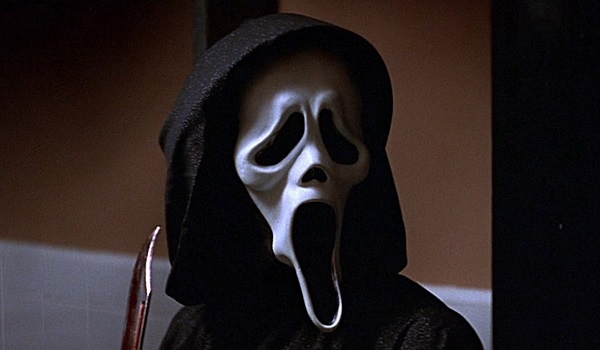The use of
teen punishment occurs after the five characters had been drinking and smoking
which then led to two of them going to have sex (blond and the athlete).
Because they were young and having pre-marital sex this meant the blonde one
was the first to be murdered. Even though the focus of the film is that the
girl who is the virgin has to be the last to die the ending of it suggest it
wasn’t just about her being a virgin and ‘pure’ as in the final scene when they
are being told about why they have to die the older woman says ‘the virgin’
looking at the female character who seems to which the older women replies ‘ we
work with what we’ve got’ this suggest the ‘final girl’ isn’t pure and a virgin
but is the less sexual or sexualised female out of the two. This also suggest
that the film is trying to show that the world isn’t always black and white. The
film was clever in surprising the audience of what they would assume would
happen, as because horror films have become predictable and for the genre to
grow and expand they’ve had to make changes. Cabin in the woods did this by letting
the male character survive along with the virgin. Knives, axes, guns, and wood is used to represent
phallic imagery. These weapons are what kill the people use to kill the zombies
and other monsters and other people like the scientist. The males mostly use
them, this represents the masculinity and power as they are using their
physical force to kill. The final scenes the final girl has the chance to kill
her male friend as she knows it will save the world however she can’t do it and
backs down, this shows her weakness as a female which is typical of female
representations in horror films.
Saturday, 24 June 2017
Cabin in the woods- How the film makes interesting use of conventions and sub-genres
Firstly, the conventions of all the character types makes it
a typical horror film as it has, the dumb blonde (whore), athlete, scholar, the
fool and the virgin. The use of these characters is interesting as they use it
as a way of each character having a meaning and needing to be sacrificed. The
other thing is the use of the convention of the final girl as the girl who is
the virgin is left until last, the interesting twist that this film has put on
is that even though at one point she seems to be the last one alive another is
not dead. This means the conventional way that these horror films end has been distorted. However the blond in the film wasn't always blond as at the begging she says she had recently died it, this suggest she wasn't the "dumb blonde" character all along and even though the colour of her hair had changed to make it conventional she hadn't always been the "dumb" blonde. This film also has many conventions of different horror sub-genres for example
the use of zombies as a way of killing puts this in a zombie category however
there is also monsters, werewolves and there is also a lot of blood and
violence which puts it in the slasher category, it is also a slasher as it has
the final girl and the victims being teens. This then explains the use of teen
punishment. These things make the film interesting as most films stick to one
sub-genre with little bits of one or two element from other sub-genre, however
The cabin in the woods isn’t clearly one sub-genre and plays with different aspects
of all of them.
Thursday, 22 June 2017
Friday, 16 June 2017
Summary of 12 icons of horror
Summary of 12 icons of horror


Religious symbols-
appear in a lot of horror. Different themes, life and death, good vs evil,
spirits.
Things about any type of belief something greater then
humanity (voodoo, Satan)


Symbols of death-
(shown by, coffins, gravestones, skeletons). Can be confusion between life and
death (ghosts, zombies).
Light- stand for
hope, transition, escape and death. Common sources – candles, lanterns,
flashlights. With darkness surrounding them.
Colours-
symbolise themes and power of good and evil. Red- evil, blood, lust, violence. As
well as black
Weapons- phallic
symbolism suggest masculine power. – knife, gun, swords, club, saw.
Doors and windows-
symbolise characterisation’s. Windows- limited perspective and like a
spectator. Mothers- look out of windows ( trapped in their home because of
children). Door symbolise opportunity- doors and windows- means entrapment or
freedom.
Tunnels and corridors-
represent the passage to death, resurrection or life
Keys/Locks-
symbolise secrets, confinement and hidden objects.
Dolls- child's toy
(happiness, innocence, nurturing) – distorted human qualities and exaggerated
features. – symbolism can include sexuality, death, desire, regret, family, ageing.


Masks- used to
disguised evil, Unnerving.





Mirrors-
represent dualities of characters, vanity, sexual themes. Broken mirrors-
symbolise shattered lives and personalities.
Subscribe to:
Comments (Atom)
How far do changes to regulation of media reflect broader social changes?
How far do changes to regulation of media reflect broader social changes? The purpose of regulation is to control and protect, by controll...
-
How far do changes to regulation of media reflect broader social changes? The purpose of regulation is to control and protect, by controll...
-
How does narrative apply to your work. In the summer me and my group made a horror trailer, about a teenager and his friends who explor...
-
I will be writing about the future trailer me and my group will produce, which is about a rich man who resurrects a killer to attack and get...
